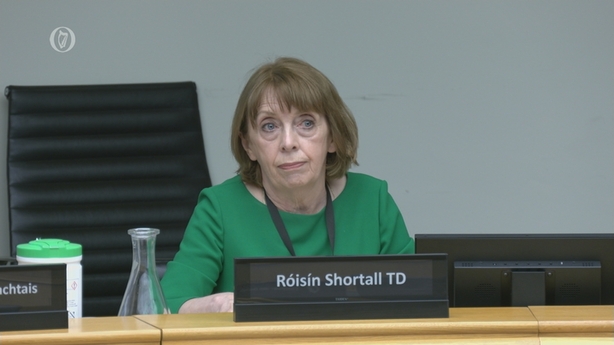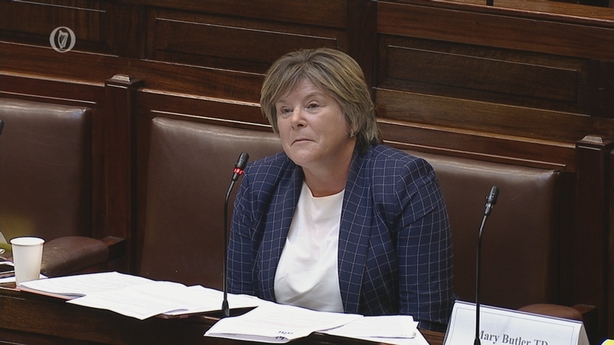New figures obtained by Social Democrats TD Róisín Shortall show that the number of children on Child and Adolescent Mental Health Services (CAMHS) waiting lists has increased by 12% in the six months from November to May of this year and by 20% in the Cork/Kerry region.
Dr Finnerty said she could not assure parents seeking care for their children that the service was safe and effective.
Ms Shortall has said that "shockingly after all that we've learned over the last couple of years about the CAMH services and the serious shortcomings, the waiting lists are actually increasing."
Speaking on RTÉ's Morning Ireland, she said there is now about 4,500 children waiting for CAMH services around the country and more than 1,600 of those are waiting over six months.
"I think it's very hard to comprehend just what it must be like for those children and their parents who have serious mental health issues," Ms Shortall said.
"And they're left waiting over six months and in some cases over 12 months."
She said that a particular note is the fact that the most problematic area of Cork and Kerry has 1,000 children on waiting lists for CAMH services.
"This is just indefensible," Ms Shortall added, saying there "is no silver bullet" for the issues.
"Staffing is one serious issue, but there are a number of issues identified by Dr Finnerty's report, all very fundamental issues in relation to how the HSE operates," Ms Shortall said.
"So, things like poor governance systems, over-centralised decision-making, a lack of data, serious problems with funding, a lack of funding in spite of what Government says and...serious problems with staff recruitment.
"And the reality is, there has been virtually no workforce planning going on within the HSE or the Department of Health for many years, and this is a very basic function of any health service".

Root and branch rebuild of CAMHS needed, says MHC chief
She said it is not just about looking to recruit, "now you have to do forward planning in relation to recruitment, which means setting over the next 10 years, for example, what is the population growth going to be, what are the ratios of staff to patients, what numbers of staff do you need, what additional places do you need in third level colleges, what clinical placements do you need within the health service".
"And none of this planning work is being done at all up to very recently," Ms Shortall said.
She added that the Oireachtas Committee on Health has been putting a real focus on this area.
"But that's very, very basic stuff that should have been done … there are a whole lot of elements here in relation to how the health service functions and indeed a number of those are key pillars of the Sláintecare plan," Ms Shortall said.
"And if we had action on that, more urgent action, a number of these issues would be dealt with".
Ms Shortall said that in relation to CAMHS there are 49 recommendations from Dr Finnerty; "three of those give it a sense of urgency about what needs to be done now, and we're talking about governance issues in particular and that she calls for the regulation of the services by the Mental Health Commission".
"She calls for a new strategy to be drawn up and endorsed by the board of the HSE with quarterly reports," she said.
"And she also talks about the Mental Health Commission overseeing the implementation of all of these recommendations.
"There's no sense from Government that they're serious about this.
"It's clear that these problems are urgent and need immediate attention by Government, and I want to hear whether the Government accepts this report or not, and do they commit to the full implementation of the recommendations of this important report."

Waiting lists double
Responding to the report published this week, Minister of State for Mental Health and Older People Mary Butler, said there was a 33% increase in CAMHS referrals in the last two years and "we have seen the waiting lists doubling in the last three years".
Speaking on RTÉ's Today with Philip Boucher-Hayes, Ms Butler said: "The amount of referrals into CAMHS in the last two years have increased by 33% and as a result we have seen the waiting lists doubling in the last three years.
"And the teams working in CAMHS last year saw 21% more referrals and issued 225,000 appointments."
She said that "notwithstanding the waiting lists" the "main risk" that she was concerned about "was in relation to what we saw as a result of the Maskey Report – the overprescribing of young people".
"I don't accept I did nothing about" about CAMHS concerns, Ms Butler said, adding "I was the first minister ever to instigate these comprehensive reports."
"We never had the information where all 75 CAMHS teams in the country cooperated with an audit and a review from the HSE and the Mental Health Commission," she said.
"There was nothing new I found in the final report that we hadn't already learned about in the earlier report.
"There are very many genuine concerns raised by Dr Finnerty in her report that we will address, but we actually started to address them immediately after the interim report was put in place."
Minister Butler said she is "currently looking" at a change to how CAMHS teams are distributed.
"So we have 818 staff, 80 consultant psychiatrists, working across 75 teams," she said.
"So we are currently looking at the situation to see would we be better off having less teams better staffed and asking parents to travel that little bit longer, making sure they would have the supports they would need when they get there due to the facts that we do have issues in relation to staffing full teams.
"The current set up of CAMHS with 75 teams not fully staffed is not working." she added.
Minister Butler said that when a young person goes to a GP "there should be a central referral across all the nine Community Health Organisations, so when that child is referred, regardless of what supports they need there’s a doorway for them, a pathway for them.
"That’s not the case at the moment and the waiting lists are too long.
"I've already put in place a national clinical lead because we didn't have that oversight.
"We now have a national lead and a youth mental health office with five people working there – four and half posts in place."
She said the national lead "will have executive function and will be answerable to the new (HSE) CEO Bernard Gloster".
Read more: Settlement for boy treated by South Kerry CAMHS as family call for full public inquiry

